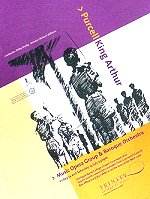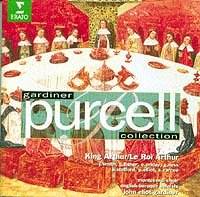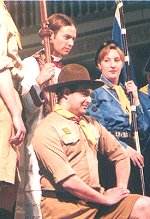
It is not easy to characterise a really exceptional achievement in Seen&Heard, which has a tendency to squander adjectives! No allowances are required because this was a student production; professional standards were expected and delivered.
Trinity College of Music is soon moving into this sumptuous World
Heritage site as its new home, and this was the second recent opportunity
to experience what they have to offer to South East London, following an
impressive performance of
Strauss's Alpine
Symphony at Blackheath Halls.
 King Arthur by Dryden, with music by Henry Purcell,
is a 'semi-opera' devised to involve music and dancing, spectacular scenery
and elaborate costumes. It is enveloped in myth and fantasy and observes
the Restoration convention that the main characters speak but do not sing.
The spirits Philidel and Grimald do both, putting into action spells devised
by the rival Wizards, Merlin and Osmond. It all has little to do with the
Camelot legends and there is no Round Table, despite the cover picture for
John Eliot Gardiner's admirable CD version [ERATO
4509-96552-2
Crotchet
£17 ] . Instead, there is a
complicated plot about Arthur's quest for a unified Britain, centring on
Arthur's blind fiancée, Emmeline, who is abducted by the Saxon King
of Kent, Oswald.
King Arthur by Dryden, with music by Henry Purcell,
is a 'semi-opera' devised to involve music and dancing, spectacular scenery
and elaborate costumes. It is enveloped in myth and fantasy and observes
the Restoration convention that the main characters speak but do not sing.
The spirits Philidel and Grimald do both, putting into action spells devised
by the rival Wizards, Merlin and Osmond. It all has little to do with the
Camelot legends and there is no Round Table, despite the cover picture for
John Eliot Gardiner's admirable CD version [ERATO
4509-96552-2
Crotchet
£17 ] . Instead, there is a
complicated plot about Arthur's quest for a unified Britain, centring on
Arthur's blind fiancée, Emmeline, who is abducted by the Saxon King
of Kent, Oswald.
Richard Williams devised his staged realisation of Purcell's problematic masterwork around the challenges and restrictions of the magnificent baroque chapel of the former Royal Naval College, grasping the opportunity to give it in so apt a setting with daring originality, yet with so light a touch as to cause no possible offence in an ecclesiastical building, nor marring at all the powerful effect of Purcell's ever-astonishing music, despite all the manifest incongruities. The frustrations of normal concerts in the Chapel, with most performers invisible to the audience on the flat floor, was solved at a stroke by building a high platform stage, upon which the impressively gifted student actor/singers revelled in their opportunities to portray uninhibitedly an idealised England of the 1950s, in which rival magicians with their Good and Evil spirits (reminding one of the new world of Harry Potter) fought.

The inventiveness of incident and surety of its accomplishment was astonishing,
and had the audience in gales of laughter. It was all achieved, apparently,
in a short three weeks, which was hard to credit. The England of Saint George
prevailed, as Dryden's text demanded. King Arthur was accompanied by an entourage
of Boy Scouts and Girl Guides, and there was a final celebratory procession
of worthy citizens representing Best of Britain, featuring a uniformed nurse,
a butcher (proud purveyor of British Beef, naturally), a Bobby & a postman
with his bicycle.
This production, which brought the work to life for a modern audience in so apt a baroque setting, exploits the opportunity for heroics and jingoism, but these are counterpointed by some scenes of extraordinary expressiveness, notably the famous Frost Scene, enacted so convincingly as to make us too shiver in a hot night, and a lovely quarrel and reconciliation duet You say, 'tis Love creates the pain - - - . The patriotic song Fairest isle was given with a touching naivety by a picnicker dressed as Brittania, helmeted and swathed in the Union Jack.
Philip Thorby studied at Trinity and is now its director of early music studies. He is a flamboyant conductor and enthused his forces, achieving fully assimilated Baroque performance style and co-ordinating singing and playing with split-second precision, remarkable with so much elaborate stage activity going on all the time. The production never jarred with Purcell.
The Williams/Thorby/Trinity King Arthur deserves a wider currency than these two triumphant performances and demands early revival.
Peter Grahame Woolf
 Return to:
Return to: